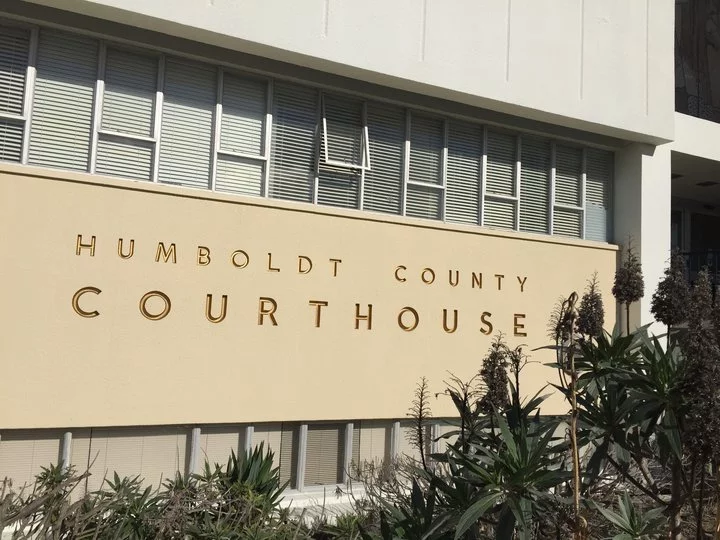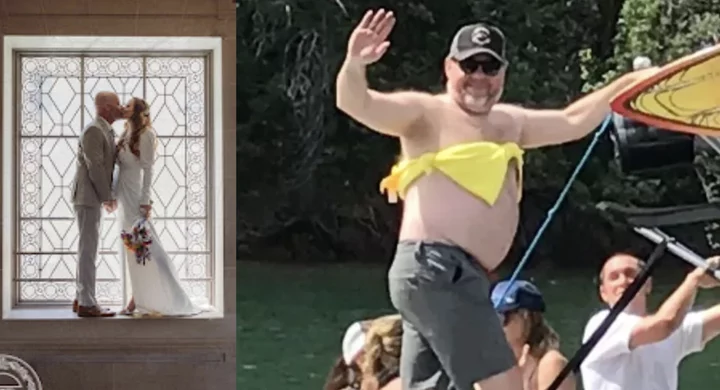File photo.
A long-running feud between former Humboldt County Superior Court Judge Gregory Kreis and local blogger John Chiv recently made its way into the courtroom, where a judge in small claims court found Chiv guilty of libel for publishing “demeaning” photos of Kreis, a decision that one First Amendment expert found baffling and possibly unconstitutional.
In her judgment, issued on Dec. 11, visiting Judge Ksenia “Kay” Tsenin wrote, “These images [of Kreis] were published with the malicious intent to demean and ridicule and harm the reputation of Gregory Kreis,” and she ordered Chiv to remove the photos from his blog.
That decision might not stand. On Wednesday, in response to a motion from Chiv to vacate the ruling, Judge Tsenin suspended the judgment and scheduled a new hearing for Feb. 24. Before doing so, however, she reiterated her belief that Chiv’s “consistent posting” of two particular photos of Kreis was “malicious” and “not journalistic.”
“Whether it’s defamation is a whole ‘nother story,” Judge Tsenin observed.
Indeed it is, agreed David Loy, legal director for the First Amendment Coalition, a nonprofit dedicated to protecting press freedom. In a recent phone interview, Loy said that, because libel is defined as a published false statement that is damaging to a person’s reputation, the first step in any libel case — the “threshold element” to consider — is whether there has been a published false statement of fact, not opinion.
“It’s the plaintiff’s burden to prove falsehood,” Loy explained.
Can a photo constitute a false statement? Loy said it’s hard to see how, unless it had been manipulated or misrepresented, which Kreis did not allege here. But regardless, malice isn’t the legal threshold, nor is “an intent to demean and ridicule.”
“The truth can be embarrassing,” Loy said.
Kreis, who agreed to resign from the bench last May after being officially censured for 17 acts of admitted misconduct, filed his claim against Chiv in small claims court in August. The central argument of the claim was that Chiv had published a lie about him in a post published on August 19, 2024.
“The defendant has libeled my name when he published a lie on his blog that I threatened him in an open courtroom,” Kreis wrote in his claim. He’s seeking only a single dollar in damages. “Money is not my priority,” he explained. “I just want him to stop disparging [sic] my name in his blog and harassing me which has impacted my ability to practice and my reputation in the legal field.”
Chiv has published dozens if not hundreds of posts about Kreis over the years. (A Google search for “Kreis” on his site returns more than 30 pages of results.) He was closely following a case in which Rory Kalin, then an attorney with the Public Defender’s Office, accused then-Judge Kreis of physically assaulting him and making antisemitic insults during a 2019 Memorial Day celebration at Shasta Lake, as well as the subsequent misconduct investigation by the California Commission on Judicial Performance. Chiv also published details from Kreis’s acrimonious divorce proceedings, including the status of his personal finances, and peppered his coverage with insults.
Last August the animus between the two sparked a tense exchange in court that would become the basis of Kreis’s libel suit. Chiv reported it under the headline, “Was Kreis’ threat to me in open court recorded?” His post said, “I believe Kreis’ display of machismo is meant to intimidate me.”
Kreis, in his small claims suit, disputed Chiv’s account of the exchange, saying he “published a lie on his blog” by describing the interaction as a threat.
Aside from that point of contention, their accounts of the exchange more or less align with each other — and with that of a court bailiff whose witness statement Kreis submitted as part of his claim. It went down like this: Kreis said something along the lines of, “Do you have something to say to me?” Chiv replied that he did not. Kreis said something back — “Are you sure? As it seems like you’ve had a lot to write about me lately,” in Kreis’s version; “I do have something to say to you,” in Chiv’s — and that was the end of it.
In addition to seeking one dollar in damages, Kreis asked for an injunction preventing Chiv “from libeling or defaming me in the future.” In an accompanying trial brief, Kreis complained about Chiv’s use of the two photos below, one showing Kreis and his ex-wife on their wedding day, the other showing Kreis goofing around on a boat during the fateful Memorial Day lake festivities. (Chiv has posted the latter photo numerous times, though it was first published by the Times-Standard, in 2020.)
Photos submitted as part of Kreis’s small claims court filings.
###
Kreis’s brief alleges that Chiv posted the boat photo “for no other purpose than to attempt to ridicule and embarrass.” It also complains about a post in which Chiv refers to Kreis as a “selfish, unremorseful, narcissist prick that has no business practicing as a lawyer; much less in Humboldt.” And it objects to Chiv having published his wedding photo with a “sick to my stomach” emoji [🤢] “attacking the personal appearance of both Plaintiff and his wife.”
Kreis asked the judge to consider “the totality of the circumstances” by looking at Chiv’s “lie” (the alleged courtroom threat) alongside his other blog content, which he says “maliciously attacked Plaintiff as an attorney and posted pictures of Plaintiff in a negative light to harass and disparage Plaintiff’s professional and personal character.”
In her Dec. 11 ruling in favor of Kreis, however, Judge Tsenin mentioned only the photos and the alleged “malicious” intent behind them; it made no mention of the courtroom incident, nor the truth or falsity of anything Chiv posted.
That’s a problem, from a First Amendment perspective, according to Loy — as was Judge Tsenin’s in-court observation that Chiv’s repeated photo-publishing was “malicious” and “not journalistic.”
“If there was no false statement of fact, there can be no defamation liability,” Loy said. Malice, hostility and ill will are not pertinent to that fundamental issue, and opinions about what does and does not constitute journalism are just that, opinions. “Whatever the judge’s personal views of whether [Chiv’s posts] are journalism or not should be irrelevant to the legal question of whether they’re libelous,” Loy said. “This is not a journalism seminar.”
Loy also believes Judge Tsenin likely overstepped her authority in ordering Chiv to remove all copies of the two photos from his website.
“I don’t think a small claims judge has authority to order that kind of injunction,” he said. “The jurisdiction of small claims court is limited to recovering damages.”
Aaron Morris, a partner with the southern California law firm of Morris & Stone, LLP, agrees. “Small Claims Court … can only award money damages – the judge is not permitted to fashion any sort of equitable relief,” he writes in an online article about defamation litigation. “For this reason, most attorneys never think to recommend Small Claims Court for a defamation action since the court has no power to remove the offending posts.”
Asked via phone why he decided to file his case in small claims court, Kreis said he had a variety of reasons, including speed and cost.
“All I wanted to do was stop harassing me through his statements, photos, comments, the constant barrage I’ve gotten even after I’m not public figure anymore, which he doesn’t seem to understand,” Kreis said.
In vacating her previous ruling yesterday morning, Judge Tsenin seemed to concede at least one of Loy’s points.
With Kreis standing behind the plaintiff’s table and Chiv behind the defendant’s, she posed a question: “Wouldn’t any defamation have to be false?”
Kreis brought up the alleged courtroom threat, and Judge Tsenin said the reason she didn’t address that aspect of his claim was that she considered Chiv’s account to be a subjective description — he “felt” threatened. If Kreis’s claim had been solely based on that dispute, she said, she would have ruled against him.
Loy said that’s the correct take, from a First Amendment perspective.
“If the disclosed facts are themselves substantially true, [then] generally speaking, you can’t sue someone for expressing their interpretation or opinion about those facts,” he said. “I mean, one can disagree with the interpretation — is it a threat or is it not? — but that’s a matter of opinion.”
The case is far from over. When Chiv didn’t immediately remove all of the contested photos from his site, Kreis filed an “Order to Show Cause and Affidavit for Contempt.” Chiv, meanwhile, filed his motion to vacate along with a request for appeal. And they each had new filings to be considered on Wednesday. The next hearing for the case is scheduled for Feb. 24.
In the meantime, Kreis may pursue another legal avenue. After Wednesday’s hearing, he said he may seek a civil harassment restraining order against Chiv. However, Loy said the same constitutional issue will apply in that context.
“This has happened, where people do try to do an end run around defamation law by characterizing it as ‘harassment,’” he said. An anti-harassment restraining order “cannot be based on speech protected by the First Amendment, and it can’t be based on the fact that, you know, somebody’s saying mean things about me online.”
###
PREVIOUSLY
- Judge Gregory Kreis Censured for Misconduct, Permanently Resigns From the Bench in California
- Judge Kreis Denies Wrongdoing in Official Response to Misconduct Allegations
- Presiding Judge Gregory Kreis Facing Formal Inquiry Into 19 Counts of Alleged Misconduct, Including Drug and Alcohol Use, Sexually Inappropriate Behavior and Antisemitic Remarks
- Judge Dismisses Rory Kalin’s Lawsuit Against Humboldt County, Public Defender’s Office Employees
- Judge Sides With Publishers of Rio Dell Times in First Amendment Ruling Against Arcata Attorney and Client


CLICK TO MANAGE